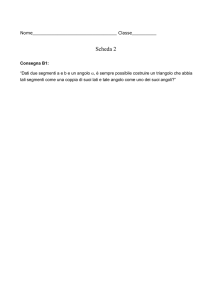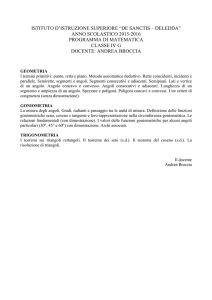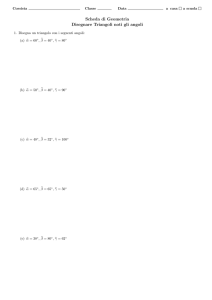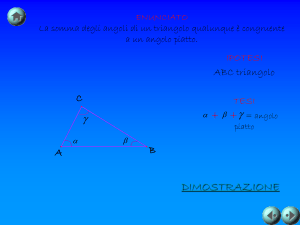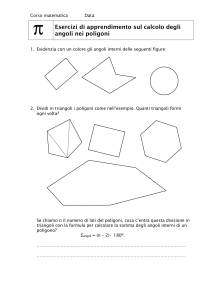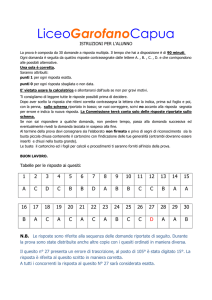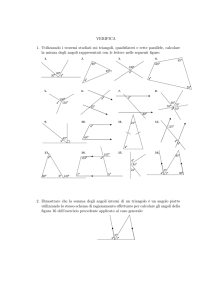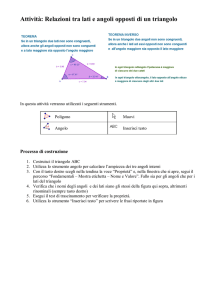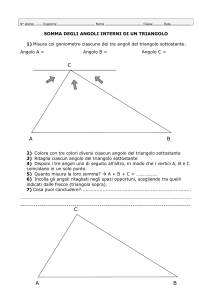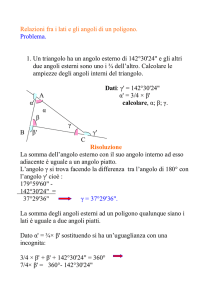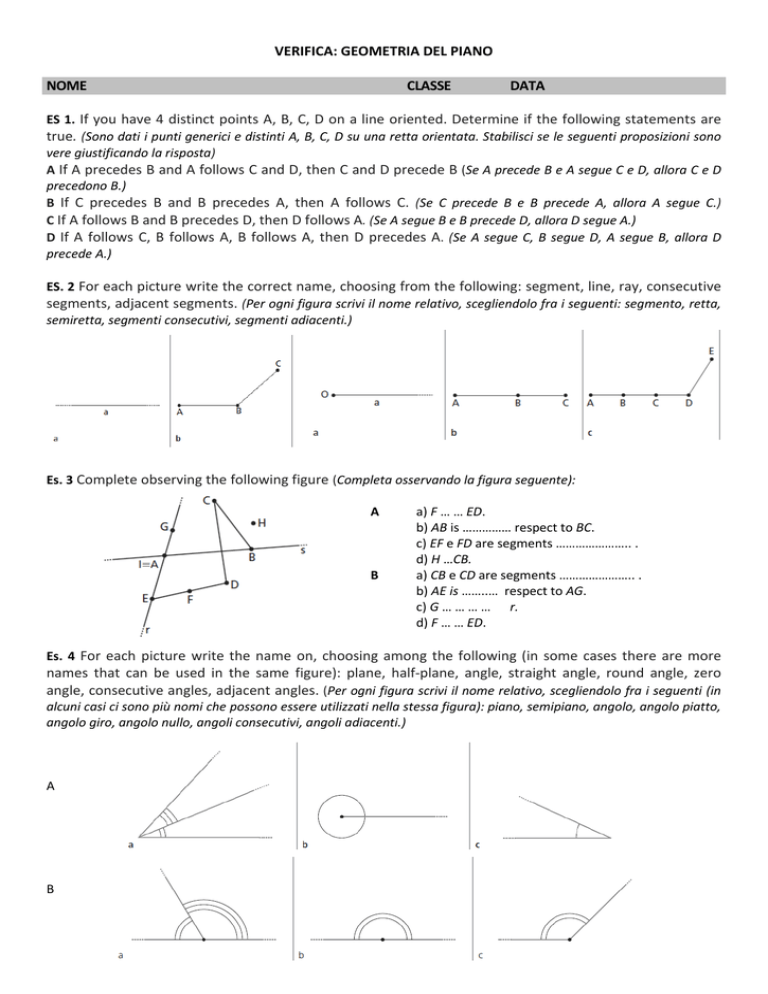
VERIFICA: GEOMETRIA DEL PIANO
NOME
CLASSE
DATA
ES 1. If you have 4 distinct points A, B, C, D on a line oriented. Determine if the following statements are
true. (Sono dati i punti generici e distinti A, B, C, D su una retta orientata. Stabilisci se le seguenti proposizioni sono
vere giustificando la risposta)
A If A precedes B and A follows C and D, then C and D precede B (Se A precede B e A segue C e D, allora C e D
precedono B.)
B If C precedes B and B precedes A, then A follows C. (Se C precede B e B precede A, allora A segue C.)
C If A follows B and B precedes D, then D follows A. (Se A segue B e B precede D, allora D segue A.)
D If A follows C, B follows A, B follows A, then D precedes A. (Se A segue C, B segue D, A segue B, allora D
precede A.)
ES. 2 For each picture write the correct name, choosing from the following: segment, line, ray, consecutive
segments, adjacent segments. (Per ogni figura scrivi il nome relativo, scegliendolo fra i seguenti: segmento, retta,
semiretta, segmenti consecutivi, segmenti adiacenti.)
Es. 3 Complete observing the following figure (Completa osservando la figura seguente):
A
B
a) F … … ED.
b) AB is …………… respect to BC.
c) EF e FD are segments ………………….. .
d) H …CB.
a) CB e CD are segments ………………….. .
b) AE is ……..… respect to AG.
c) G … … … … r.
d) F … … ED.
Es. 4 For each picture write the name on, choosing among the following (in some cases there are more
names that can be used in the same figure): plane, half-plane, angle, straight angle, round angle, zero
angle, consecutive angles, adjacent angles. (Per ogni figura scrivi il nome relativo, scegliendolo fra i seguenti (in
alcuni casi ci sono più nomi che possono essere utilizzati nella stessa figura): piano, semipiano, angolo, angolo piatto,
angolo giro, angolo nullo, angoli consecutivi, angoli adiacenti.)
A
B
Es. 5 Draw the figures correspond to the following description. (Disegna le figure corrispondenti alla
seguente descrizione)
A
AB, BC, CD segments, AB e BC adjacent, AB 2BC , D AB, CD AB.
B
AB, BC, CD segments, BC e CD adjacent, BC 3CD, A BC, AB 2CD.
Es. 6 For each figure indicates whether it is convex or concave (Per ogni figura indica se è convessa o
concava.)
Es. 7 Look at the picture. Which of the following relationships is true? (Osserva la figura. Quale fra le seguenti
relazioni è vera?)
A AB
3
CD
5
C AB
5
CD
3
B CD
3
AB
5
D AB
3
3
E CD
5
5
Es. 8 Only one of the following statements is a postulate of Euclidean geometry. Which one? (Solo una
delle seguenti affermazioni è un postulato della geometria euclidea. Quale?)
A For two points of the plan passes one and only one line. (Per due punti del piano passa una e una sola linea.)
B For three distinct points passes one and only one plane. (Per tre punti distinti passa uno e un solo piano.)
C For each line of a plan exists at least one point in the plane that does not belong. (Per ogni retta di un piano
esiste almeno un punto del piano che non le appartiene.)
D A corner is concave if it contains the extensions of its sides. (Un angolo è concavo se contiene i prolungamenti
dei suoi lati.)
E If two opposite corners are at the top, then they are congruent. (Se due angoli sono opposti al vertice, allora
sono congruenti.)
Es. 9 Only one of the following statements is true. Which one? (Solo una fra le seguenti affermazioni è vera.
Quale?)
A The point O precedes the point A. (Il punto O precede il punto A.)
B The point C precedes the points D and E. (Il punto C precede i
punti D ed E.)
C The point E below the point A (Il punto E segue il punto A.)
D The point B below the point D. (Il punto B segue il punto D.)
E The positions of points A and B are not comparable (Le posizioni
dei punti A e B non sono confrontabili.)
Es.10 Only one of the following statements is true. Which one? (Solo una fra le seguenti affermazioni è vera.
Quale?) The segments in the figure are (I segmenti in figura sono):
A AB and BC consecutive, BC and CD adjacent. (AB e BC consecutivi, BC e CD
adiacenti.)
B AB and BC adjacent, BC and CD in a row. (AB e BC adiacenti, BC e CD
consecutivi.)
C AB and BC adjacent, CD and DE accidents. (AB e BC adiacenti, CD e DE
incidenti.)
D BC and CD superimposed AB and DE parallel. (BC e CD sovrapposti, AB
e DE paralleli.)
E BC and CD adjacent, CD and DE attacked. (BC e CD adiacenti, CD e DE
attaccati.)
Es. 11 One of the following propositions is false. Which one? (Una delle seguenti proposizioni è falsa. Quale?)
A The opposite angles at the top are convex. (Gli angoli opposti al vertice sono convessi.)
B The sides of two opposite angles at the top are adjacent. (I lati di due angoli opposti al vertice sono adiacenti.)
C The angles opposite to the top are supplementary. (Gli angoli opposti al vertice sono supplementari.)
D The angles opposite to the top have bisectors adjacent. (Gli angoli opposti al vertice hanno le bisettrici
adiacenti.)
E Two intersecting lines form pairs of congruent angles (Due rette incidenti formano coppie di angoli
congruenti.)
Es. 12 Only one of the following statements is true. Which one? (Solo una delle seguenti affermazioni è vera.
Quale?)
A A concave angle is obtuse. (Un angolo concavo è ottuso.)
B The additional of an acute angle is concave (Il supplementare di un angolo acuto è concavo )
C The difference between two concave angles is a convex angle. (La differenza tra due angoli concavi, inferiori
all’angolo giro, è un angolo convesso.)
D The sum of two convex angles is always a concave corner. (La somma di due angoli convessi è sempre un
angolo concavo.)
.

